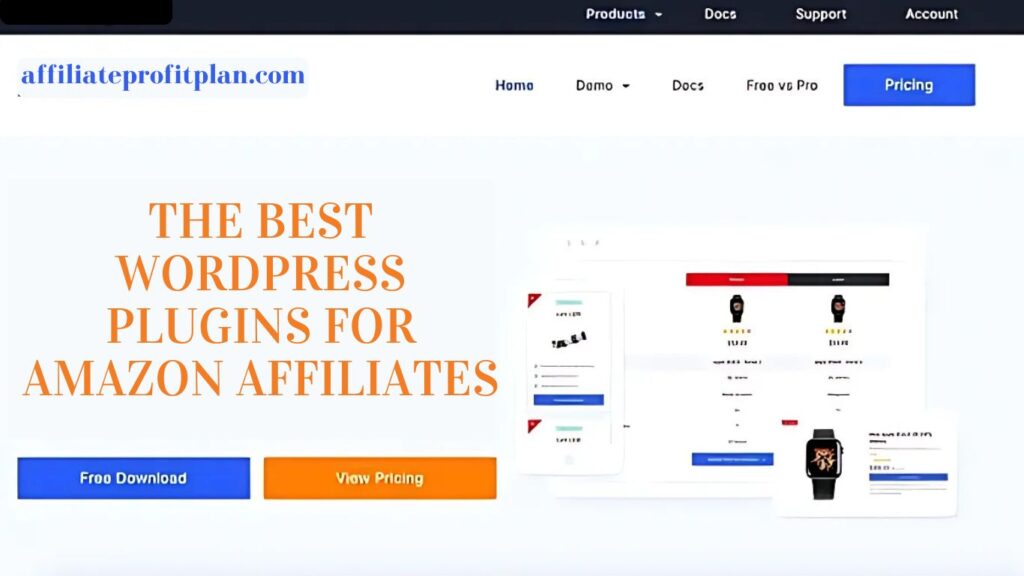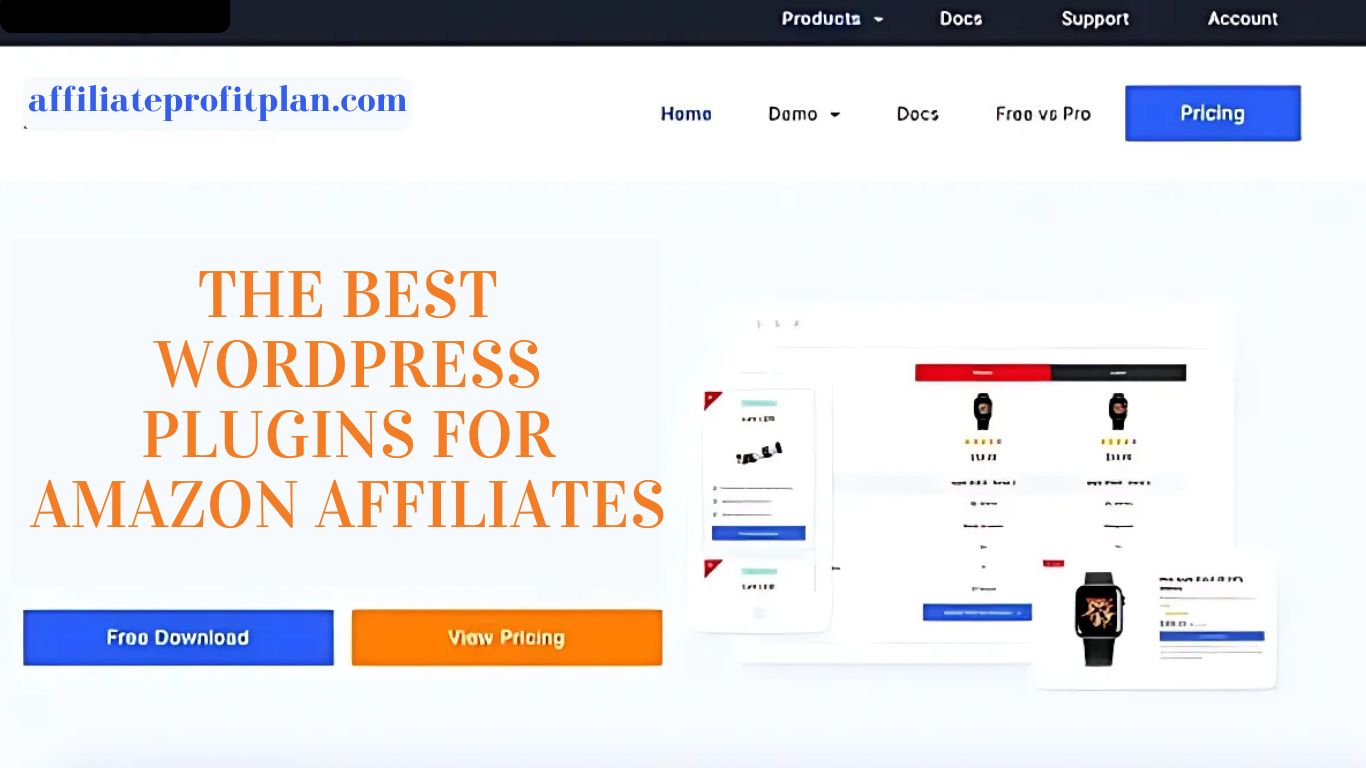Welcome to my article The Best WordPress Plugins for Amazon Affiliates. So, you’ve decided to dive into the world of Amazon affiliate marketing—congratulations! You’re now part of a thriving community where passive income dreams can become a reality. But let’s face it, running a successful affiliate site isn’t just about sprinkling some product links here and there. It’s about working smarter, not harder. Enter: WordPress plugins, the unsung heroes of the affiliate marketing world.
Think of these plugins as your trusty sidekicks, helping you handle the heavy lifting while you focus on crafting content that dazzles your audience (and persuades them to click that “Buy Now” button). From automating product imports to optimizing your site for SEO and tracking those precious affiliate clicks, WordPress plugins do it all. They’re like the Swiss Army knives of your affiliate toolkit—minus the risk of accidentally nicking your finger. But with so many plugins out there claiming to be the best, how do you separate the diamonds from the duds? That’s where this guide comes in. We’ve rounded up the crème de la crème of WordPress plugins specifically designed for Amazon affiliates. Whether you’re a seasoned pro or just getting started, these tools will help you maximize your earnings while staying compliant with Amazon’s ever-evolving policies. Ready to supercharge your affiliate site? Keep reading, because by the time you’re done, you’ll have a plugin arsenal that could make even the most seasoned affiliate marketer green with envy. Let’s get started!
Access My Proven Blueprint for $50-$100 Daily Income – Watch This FREE Video Now >>>

Why WordPress is Perfect for Amazon Affiliates
When it comes to building a website for your Amazon affiliate business, WordPress is like the MVP of website platforms—flexible, reliable, and designed to make your life easier. It’s the peanut butter to your jelly, the Batman to your Robin, the…well, you get the idea. But why exactly is WordPress the go-to choice for affiliate marketers? Let’s break it down.
First off, WordPress is ridiculously user-friendly. Whether you’re a tech wizard or someone who still Googles “how to copy and paste,” WordPress has got you covered. Its intuitive dashboard and vast library of themes make it easy to create a professional-looking site in no time. Plus, its customizability ensures that your site doesn’t look like a cookie-cutter replica of every other affiliate blog out there. You can design your site to reflect your niche, whether that’s fitness gear, kitchen gadgets, or the latest tech gizmos.
Then there’s the plugin ecosystem, which is basically the secret sauce for Amazon affiliates. Want to add product comparison tables? There’s a plugin for that. Need to cloak your affiliate links? Plugin. Want to track click-through rates? You guessed it—there’s a plugin for that too. WordPress offers a seemingly endless array of plugins specifically designed to make affiliate marketing not only manageable but also highly profitable.
Oh, and did I mention SEO? WordPress is an SEO powerhouse. Its built-in features, coupled with SEO-focused plugins, help your site rank higher on Google, making it easier for potential buyers to find your content. And since Amazon affiliates live and die by traffic, ranking well on search engines is as crucial as remembering your affiliate disclosure (hint: it’s really crucial).
Lastly, WordPress is cost-effective and scalable. Starting out? You can get by with a basic hosting plan and a free theme. As your site grows, WordPress grows with you, letting you add advanced features and functionalities without needing to start from scratch. It’s like starting with a bicycle and upgrading to a Ferrari when you’re ready to zoom.
In short, WordPress offers the perfect blend of simplicity, power, and scalability, making it the ultimate platform for Amazon affiliates who want to turn clicks into cash. So, if you haven’t hopped on the WordPress bandwagon yet, what are you waiting for? Your affiliate empire isn’t going to build itself!
Must-Have Features in a WordPress Plugin for Amazon Affiliates
Choosing the right WordPress plugin for your Amazon affiliate site is like picking the perfect tool from a toolbox—except this tool can boost your income instead of just fixing a leaky faucet. But not all plugins are created equal. To make the most of your affiliate hustle, your plugin needs to check some crucial boxes. Let’s dive into the must-have features that separate the winners from the wannabes.
1. Seamless Amazon Integration
A top-notch plugin should play nice with Amazon’s API. This feature allows you to pull in product details—prices, images, descriptions—directly from Amazon without manually copying and pasting. Not only does this save you time (because who has time for endless copy-pasting?), but it also ensures your product data stays accurate and up-to-date, keeping you compliant with Amazon’s policies.
2. Link Management and Cloaking
Affiliate links aren’t exactly pretty. A plugin that offers link cloaking can transform those long, clunky URLs into sleek, branded links that are easier for users to trust and click. Bonus points if the plugin includes link tracking, so you can monitor which links are performing best and tweak your strategy accordingly. Think of it as having a GPS for your affiliate journey.
3. Responsive Design Features
Since most online shopping happens on mobile devices these days, your plugin must support responsive design. This ensures that product tables, widgets, and images look fantastic on screens of all sizes. A plugin that can auto-optimize for mobile viewers is like having a personal stylist for your website—it just makes everything look polished.
4. Customizable Product Displays
Gone are the days of boring, static product links. Your plugin should let you create eye-catching product showcases like comparison tables, carousels, or grids. These features make your site look professional while helping visitors quickly find the products they want. It’s a win-win—better user experience for them, more clicks (and commissions) for you.
5. Click and Conversion Analytics
Data is king, especially in affiliate marketing. A good plugin should provide detailed analytics on clicks and conversions, giving you insights into what’s working and what’s not. With this information, you can fine-tune your strategy to focus on products that bring in the big bucks while dropping the duds that don’t.
6. Compliance and Disclosure Management
Amazon takes compliance seriously, and so should you. A plugin with built-in features for displaying affiliate disclosures can save you a lot of headaches—and potential bans. Look for one that allows you to easily add compliant notices wherever needed, so your site stays on the right side of Amazon’s rules.
7. Localization Features
Amazon operates multiple storefronts worldwide, so why limit your earnings to just one region? A plugin with localization features can redirect visitors to their local Amazon store automatically. It’s like being multilingual in the affiliate world—more visitors converted, more commissions earned.
8. Regular Updates and Support
Amazon’s policies change more often than your favorite streaming show gets new episodes. Your plugin should stay ahead of the curve with regular updates to maintain compatibility. Plus, access to responsive customer support can be a lifesaver if you hit a snag. After all, you don’t want a tech hiccup to stand between you and your next payout.
In the fast-paced world of affiliate marketing, the right WordPress plugin is your secret weapon. It not only makes managing your site easier but also gives you the tools to optimize and scale your earnings. With these must-have features in mind, you’ll be well-equipped to choose a plugin that sets your Amazon affiliate site up for success!
Top 5 WordPress Plugins for Amazon Affiliates
When it comes to WordPress plugins for Amazon affiliates, the options are like a buffet—plenty to choose from, but only a few truly worth loading onto your plate. Picking the right plugin can make the difference between a smooth, streamlined affiliate journey and a chaotic mess of broken links and outdated product details. To help you avoid that mess, here are the top five WordPress plugins that deserve a spot on your affiliate toolkit.
Access My Proven Blueprint for $50-$100 Daily Income – Watch This FREE Video Now >>>
1. AAWP (Amazon Affiliate WordPress Plugin)
Think of AAWP as the Swiss Army knife for Amazon affiliates. This plugin is packed with features that make your life easier and your site more engaging. From customizable product boxes to comparison tables and bestseller lists, AAWP ensures your content looks polished and professional.
But here’s the kicker—it automatically updates product details like prices and availability directly from Amazon’s API. That means no more manually updating product info (and risking non-compliance). It’s like having a personal assistant who’s always on top of things.
2. Pretty Links
Affiliate links are notorious for looking like the digital equivalent of a tangled ball of yarn. Pretty Links cleans up that mess by cloaking your links into short, branded URLs. For example, instead of sharing something like www.amazon.com/dp/B00F0FBFG0/ref…, you’ll get something sleek like www.yoursite.com/recommend/coolproduct.
Pretty Links also tracks clicks, giving you valuable insights into which links are performing best. If you’re serious about optimizing your affiliate strategy, this plugin is an absolute must-have.
3. ThirstyAffiliates
If Pretty Links is great for link cloaking, ThirstyAffiliates takes it up a notch by adding affiliate-specific features. You can organize your links into categories, auto-insert links into your content, and even track link performance across multiple campaigns.
One standout feature? Geo-targeting. ThirstyAffiliates can detect where your visitors are coming from and redirect them to their local Amazon store, boosting your chances of conversions. It’s like giving your affiliate strategy a global passport.
4. Amazon Auto Links
Amazon Auto Links is perfect for affiliates who want a “set it and forget it” solution. With this plugin, you can automatically display Amazon products on your site based on categories, keywords, or specific criteria.
The best part? It doesn’t require access to Amazon’s API, making it a great choice for new affiliates who might not have API access yet. Plus, the plugin supports localization, so your visitors can shop on their country-specific Amazon store without any extra effort on your part.
5. EasyAzon
EasyAzon is designed with simplicity in mind, making it ideal for beginners. This plugin lets you create affiliate links directly from your WordPress editor—no need to open new tabs or copy-paste URLs.
It also supports link localization, product pop-ups, and one-click add-to-cart functionality. These features not only make your site more user-friendly but also help boost your conversion rates. If you’re looking for a straightforward, beginner-friendly plugin, EasyAzon is the way to go.
Honorable Mentions
While these five plugins dominate the Amazon affiliate scene, others like WP Table Builder (for crafting sleek product tables) and AzonPress (a versatile all-in-one solution) are also worth checking out. Depending on your specific needs, you might find these tools equally valuable.
In the ever-competitive world of Amazon affiliate marketing, having the right plugins is like having the right tools for a DIY project. They make your work easier, your site more effective, and your earnings more consistent. Whether you’re a newbie or a seasoned affiliate pro, these plugins can help you take your Amazon game to the next level. So go ahead, install a few, and let the commissions roll in!
How to Optimize Plugin Usage for Maximum Earnings
Plugins are the unsung heroes of your Amazon affiliate strategy. They quietly work behind the scenes to streamline your operations, enhance user experience, and boost your earnings. But simply installing them and hoping for the best is like buying a gym membership and expecting to get fit without ever showing up. You need to actively optimize their use to reap the full benefits. Here’s how you can make the most of your WordPress plugins for maximum Amazon affiliate earnings.
1. Keep Your Plugins Updated
First things first—keep your plugins updated. Developers roll out updates to fix bugs, enhance performance, and stay compliant with Amazon’s ever-changing policies. Running outdated plugins can lead to broken links, slow load times, or worse—non-compliance that could jeopardize your affiliate account.
Pro Tip: Enable automatic updates for your key plugins or set a reminder to check for updates weekly. A well-maintained plugin is like a well-oiled machine—smooth and efficient.
2. Leverage Advanced Features
Many plugins, like AAWP or ThirstyAffiliates, come with advanced features that often go unused. For example, AAWP lets you create dynamic bestseller lists or comparison tables that update automatically. ThirstyAffiliates offers geo-targeting to redirect international traffic to the right Amazon storefront.
By diving into your plugin settings and exploring these features, you can add value to your content and cater to a global audience without extra manual effort. The more you tap into these tools, the more professional (and conversion-friendly) your site will appear.
3. Test and Track Your Links
Not all affiliate links perform equally. Some will bring in clicks but no sales, while others will quietly rake in commissions. Use plugins like Pretty Links or ThirstyAffiliates to track link performance and identify top-performing pages or products.
Armed with this data, you can double down on what works—whether that’s promoting high-converting products, tweaking your call-to-action, or revamping underperforming pages. It’s like having a cheat sheet for success.
4. Don’t Overload Your Site with Plugins
While it’s tempting to install every plugin that promises to boost your affiliate game, moderation is key. Too many plugins can slow down your site, which frustrates visitors and hurts your SEO rankings. Stick to essential plugins that offer tangible benefits and deactivate or uninstall those you no longer use.
Pro Tip: Use tools like GTmetrix or Google PageSpeed Insights to monitor your site’s speed. If a plugin is dragging down performance, it might be time to part ways.
5. Focus on User Experience (UX)
Plugins can do a lot more than just simplify your workflow—they can also enhance your site’s UX, which directly impacts your earnings. Use plugins to create visually appealing product boxes, comparison tables, or carousels that make it easy for users to make purchasing decisions.
Additionally, ensure that your site is mobile-friendly. Many affiliate purchases happen on mobile devices, so plugins that optimize your site’s responsiveness are worth their weight in gold. A smooth, intuitive user experience translates to happier visitors and higher conversions.
6. Stay Compliant with Amazon’s Policies
Amazon has strict rules about how affiliates can promote products, and violating these can get you banned faster than you can say “cookie policy.” Use plugins that help you stay compliant, like those with auto-link localization or built-in disclosure options.
For example, some plugins allow you to automatically display affiliate disclaimers, ensuring you’re transparent about your relationships without having to manually add disclaimers to every page. Compliance isn’t just a box to check—it’s a way to build trust with your audience.
7. Experiment and Adapt
The digital landscape is ever-changing, and what works today might not work tomorrow. Use your plugins as part of an ongoing experiment to find what resonates with your audience. Test different product layouts, calls-to-action, and link placements to see what drives the most engagement and conversions.
Plugins like A/B testing tools can help you identify winning strategies. Think of it as fine-tuning an instrument—the better you adjust, the sweeter the music (or earnings).
By optimizing your plugin usage, you can turn your WordPress site into a well-oiled Amazon affiliate machine. It’s not just about installing tools; it’s about using them strategically to create a seamless experience for both you and your audience. With the right tweaks and a bit of effort, your plugins can do the heavy lifting while you focus on growing your business and watching those commissions roll in.
Choosing the Right Plugin for Your Needs
Picking the right WordPress plugin for your Amazon affiliate site is a bit like choosing the perfect outfit for a first date—you want it to fit your style, meet the occasion, and not fall apart under pressure. With so many plugins vying for your attention, it’s easy to feel overwhelmed. But fear not! Here’s how you can confidently choose the plugin that aligns with your needs and goals.
1. Define Your Goals
Before you dive into the endless sea of plugins, take a moment to clarify what you need. Are you looking to display eye-catching product comparison tables? Do you want an easy way to cloak and manage affiliate links? Or perhaps you need a tool that tracks clicks and conversions? Knowing your goals will narrow down your choices faster than you can say “Amazon bestseller.”
Pro Tip: Write down your top three must-have features. This simple step will save you from falling for shiny plugins that promise the world but don’t deliver on your specific needs.
2. Look for Compatibility
Not all plugins play nice with every WordPress theme or other plugins. Before committing to a plugin, check if it’s compatible with your current setup. A plugin that clashes with your theme or breaks your site is about as helpful as a chocolate teapot.
Check reviews and developer notes for compatibility mentions, and consider testing the plugin on a staging site before rolling it out live.
3. Prioritize User-Friendliness
Let’s be honest—no one wants to spend hours deciphering a plugin’s interface or reading a 50-page manual. Look for plugins with intuitive designs and clear instructions. If you need a Ph.D. to figure out how to insert a product link, it’s not worth your time.
Bonus Tip: Many plugins offer video tutorials or demos. Watch one to get a feel for the user experience before clicking “Install.”
4. Check Reviews and Ratings
The WordPress plugin marketplace is a bustling bazaar of options, and the customer reviews section is your best friend. Pay attention to ratings and read feedback from other users, especially those who use the plugin for Amazon affiliate marketing.
Look for patterns in the reviews. Are people raving about its features or complaining about glitches? Does the support team respond promptly to issues? A highly rated plugin with an active support team is a green flag.
5. Evaluate Pricing Options
While free plugins are tempting (and often quite good), premium plugins typically offer advanced features and dedicated support. Evaluate whether the additional cost aligns with your goals. If a paid plugin can save you hours of manual work or boost conversions, it’s an investment worth making.
Many premium plugins also offer trial periods or money-back guarantees, so you can test them out without commitment.
6. Consider Scalability
Think long-term. A plugin that meets your current needs is great, but will it grow with your business? If you plan to scale your affiliate site by adding more products, targeting international audiences, or experimenting with different content formats, choose a plugin with robust features that can keep up.
For example, plugins like AAWP or ThirstyAffiliates offer features like geo-targeting and automated updates, which are perfect for sites with global traffic or extensive product lists.
7. Test Before You Commit
The beauty of WordPress is that you can try out plugins without locking yourself in. Install a plugin, experiment with its features, and see if it aligns with your expectations. If it doesn’t deliver, don’t hesitate to uninstall and move on to the next option.
Pro Tip: Use tools like WP Reset or a staging environment to test plugins without risking your live site.
8. Look for Active Support and Updates
A good plugin is like a loyal partner—it doesn’t leave you hanging when things get tough. Check if the plugin is actively maintained and supported. Regular updates indicate that the developers are keeping up with WordPress changes and Amazon’s policies, which is crucial for long-term reliability.
Choosing the right plugin isn’t just about ticking boxes; it’s about finding a tool that complements your workflow and empowers you to succeed. By taking the time to evaluate your options, you’ll not only save yourself headaches down the road but also set your site up for affiliate success. After all, a great plugin is the secret weapon that turns your WordPress site into a high-performing, commission-earning powerhouse.
Conclusion: Plugins as a Power Tool for Amazon Affiliates
Let’s face it: running a successful Amazon affiliate site without plugins is like trying to build a house with just a hammer. Sure, you could do it, but why make your life harder when there are power tools designed to make the process faster, easier, and more effective? WordPress plugins aren’t just bells and whistles; they’re the engines that drive your affiliate marketing machine.
Plugins help you automate tedious tasks, optimize your content for better conversions, and manage your links like a pro. They let you create dynamic product showcases, track your clicks, and even stay compliant with Amazon’s policies—all while sipping coffee and pretending you’re not secretly stressed about your next payout.
Access My Proven Blueprint for $50-$100 Daily Income – Watch This FREE Video Now >>>
The Right Plugin Can Make or Break Your Strategy
Choosing the right plugins is crucial because they directly impact your site’s performance and your income potential. A well-optimized site with tools like AAWP or ThirstyAffiliates can make your content shine, keeping visitors engaged long enough to click that golden “Buy Now” button. And let’s not forget: happy visitors mean higher conversions, which means you’ll be smiling all the way to the bank.
Keep Testing and Learning
The world of Amazon affiliate marketing is ever-changing, and so is the WordPress plugin ecosystem. What works for you today might need tweaking tomorrow. Don’t be afraid to experiment with new plugins, explore updates, or even switch tools if something better comes along. Think of it as ongoing maintenance for your business powerhouse.
Plugins Are Your Business Partners
Ultimately, plugins are more than just tools—they’re your silent business partners. They save you time, amplify your efforts, and help you build a professional site that visitors trust and enjoy. Treat them well (a.k.a. keep them updated and compatible), and they’ll return the favor by helping you grow your affiliate empire.
So, go ahead—embrace the power of plugins. With the right tools in your arsenal, you’ll not only work smarter but also boost your earnings, all while enjoying the satisfaction of watching your affiliate business thrive. And isn’t that what we’re all here for? Well, that, and the joy of checking your Amazon commissions every morning like it’s Christmas. 🎄
Thanks a lot for reading my article on “The Best WordPress Plugins for Amazon Affiliates” till the end. Hope you’ve helped. See you with another article.










